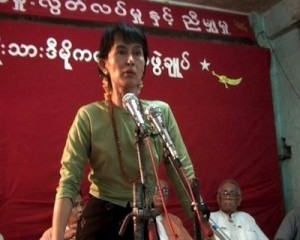In recent years, Myanmar has made news in the West for all the wrong reasons. Most notorious in this respect was when the military junta, which now rules this country, brutally cracked down on Buddhist monks who were leading protests for democratic freedoms, and then again when it inhumanely refused international aid for victims of Cyclone Nargis.
 Conspicuous by its lack of coverage, however, was the junta’s detention of Myanmar’s democracy leader Aung San Suu Kyi. And this, by any objective criteria, is a glaring oversight; not least because Suu Kyi is to Myanmar what Nelson Mandela is to South Africa.
Conspicuous by its lack of coverage, however, was the junta’s detention of Myanmar’s democracy leader Aung San Suu Kyi. And this, by any objective criteria, is a glaring oversight; not least because Suu Kyi is to Myanmar what Nelson Mandela is to South Africa.
Granted, given that she has only been under house arrest, effectively, for 20 years, she has not suffered the privations Mandela endured doing hard labor in prison for 27 years.
All the same, her heroic, even if terminally futile, struggle to restore democracy has garnered her remarkable spurts of international attention and acclaim. Most notable in this respect was when she was awarded the Nobel Peace Prize in 1991 – after the National League for Democracy party she founded won a landslide general election (in 1990), which the military refused to recognize.
In fact, fearing her popularity and this election result, the military placed her under house arrest and jailed thousands of her supporters in 1989.
And there’s no clearer indication that the ruling junta intends to keep her out of politics for the rest her life than the fact that it convicted her yesterday – after a show trial for violating the terms of her house arrest.
Specifically, she was accused of allowing a supportive American to stay in her home after he swam across a lake and showed up uninvited. She was sentenced to 18 months, which, as was the case in 1989, guarantees that she won’t be able to upset the military’s plan to put on show elections next year.
But please beware that condemnation of Suu Kyi’s conviction by Western leaders (like President Obama) and international organizations (like the UN) will prove utterly feckless. Because Myanmar’s ruling generals have about as much regard for their political censure and threats of sanctions as North Korean President Kim Jong-il.
Frankly, the struggle against military dictatorship in Myanmar does not inspire the kind of moral support in the West (or anywhere) that the struggle against Apartheid in South Africa did. And this is why the calls for Suu Kyi’s release from house arrest will continue to ring hollow juxtaposed to calls that precipitated Mandela’s release from prison.
Related commentaries:
Crackdown in Myanmar
Cyclone Nargiss
UN intervenes in Myanmar
Leave a Reply
You must be logged in to post a comment.